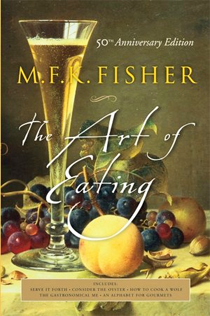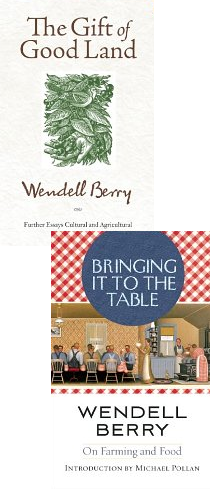Eating’s better than reading about eating. But you’ll always eat good stuff – and never eat bad stuff – if you read and think about what these folks have been writing.
Michael Pollan
I would always recommend that you read a book or two by Michael Pollan, the most thoughtful guy writing in this subject area. He is smart and funny and always right on the money in his analyses of eating real food vs. “edible foodlike substances”. He explains comprehensively but concisely the “American paradox”: how and why Americans have become less healthy while worrying more and more about nutrition.
Each of his great books is thought-provoking and fast-reading — and each weighs in at less than a pound. Even if you don’t read much non-fiction, you owe it to yourself to read this guy. You’ll tell everyone you know about Michael Pollan’s books – and your friends will be borrowing them for years.
M.F.K. Fisher
M.F.K. Fisher wrote How To Cook A Wolf at the tail end of the last Depression. The wolf was hunger. Or, more generally, scarcity. And anxiety about scarcity.
So she wrote a kind of recipe for making the most of scarce resources. How to stretch a budget and get maximum nourishment, pleasure, entertainment and satisfaction from what you have. Without worrying about what you don’t have. At least when you’re at the dining table. When the meal is an important social experience that reinforces relationships.
A 1930s-1940s Better Cheaper Slower. I read it in The Art of Eating, a 784-page collection of five of M.F.K. Fisher’s books: “Serve it Forth,” “Consider the Oyster,” “How to Cook a Wolf,” “The Gastronomical Me” and “An Alphabet for Gourmets.” A lot of pleasure and thought for $16.
Wendell Berry
I first read Wendell Berry, the great farmer-philosopher, in 1971 when his “Think Little” essay appeared in The Last Whole Earth Catalog. He wrote, “Odd as I am sure it will appear to some, I can think of no better form of personal involvement in the cure of the environment than that of gardening. A person who is growing a garden, if he is growing it organically, is improving a piece of the world. He is producing something to eat, which makes him somewhat independent of the grocery business, but he is also enlarging, for himself, the meaning of food and the pleasure of eating. The food he grows will be fresher, more nutritious, less contaminated by poisons and preservatives and dyes, than what he can buy at the store. He is reducing the trash problem; a garden is not a disposable container, and it will digest and re-use its own wastes. If he enjoys working in his garden, then he is less dependent on an automobile or a merchant for his pleasure. He is involving himself directly in the work of feeding people.”
I still read him. Sometimes I eat while I read.


